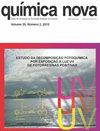河口环境中二氧化碳分压直接和间接测量方法的评价
IF 0.5
4区 化学
Q4 CHEMISTRY, MULTIDISCIPLINARY
引用次数: 1
摘要
评估河口环境中直接和间接的二氧化碳分压测量。河口是全球动态系统,其特征是向大气排放二氧化碳。然而,它们在co2分压和co2分压上都表现出较大的时空变异性。在这些敏感和复杂的环境中,获得连续和准确的空气和水中二氧化碳分压测量以监测二氧化碳分压,增加二氧化碳排放变得势在必行。目前,对河口地区pCO2的直接测量和FCO2的估计仍然很少,经常使用间接的pCO2估计,包括至少两个碳酸盐系统的其他参数的测量:总碱度,溶解无机碳或ph。在这项工作中,我们评估了最近在捷亚里贝河河口- ce的pCO2的直接和间接测量。本研究对主要用于估算二氧化碳分压的两种主要方法获得的数据进行了批判性分析,提出了提高数据一致性的挑战,以便更好地了解河口水域的碳酸盐系统。我们强调了在沿海环境中进行连续二氧化碳分压测量和长期监测的潜力,有助于提高对区域二氧化碳交换的认识,并阐明河口在全球碳循环中的作用。本文章由计算机程序翻译,如有差异,请以英文原文为准。
AVALIAÇÃO DE MÉTODOS DIRETOS E INDIRETOS DE MEDIÇÃO DA pCO2 EM AMBIENTES ESTUARINOS
EVALUATING DIRECT AND INDIRECT pCO2 MEASUREMENTS IN ESTUARINE ENVIRONMENTS. Estuaries are dynamic systems globally characterized as sources of CO2 to the atmosphere. However, they present large spatial-temporal variability in both pCO2 and FCO2. Increased CO2 emissions turns imperative to obtain continuous and accurate measurements of pCO2 in air and water to monitor FCO2 in these sensitive and complex environments. Currently, direct measurements of pCO2 and estimates of FCO2 in estuarine regions are still scarce and frequently the indirect pCO2 estimates are used that consists of measurements from at least two other parameters of the carbonate system: total alkalinity, dissolved inorganic carbon or pH. In this work, we evaluated recent direct and indirect measurements of pCO2 in the Jaguaribe River estuary-CE. This study provides a critical analysis of the data obtained through the two main methods mostly used to estimate pCO2, presenting the challenges towards greater consistency in obtaining data for a better understanding of the carbonate system in estuarine waters. We highlight the potential for continuous pCO2 measurements and long-term monitoring in coastal environments, contributing to improve knowledge of regional CO2 exchanges and to elucidate the role of estuaries in the global carbon cycle.
求助全文
通过发布文献求助,成功后即可免费获取论文全文。
去求助
来源期刊

Quimica Nova
化学-化学综合
CiteScore
1.60
自引率
12.50%
发文量
72
审稿时长
2-4 weeks
期刊介绍:
Química Nova publishes in portuguese, spanish and english, original research articles, revisions, technical notes and articles about education in chemistry. All the manuscripts submitted to QN are evaluated by, at least, two reviewers (from Brazil and abroad) of recognized expertise in the field of chemistry involved in the manuscript. The Editorial Council can be eventually asked to review manuscripts. Editors are responsible for the final edition of QN.
 求助内容:
求助内容: 应助结果提醒方式:
应助结果提醒方式:


